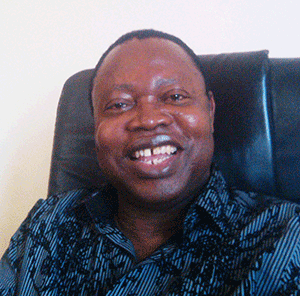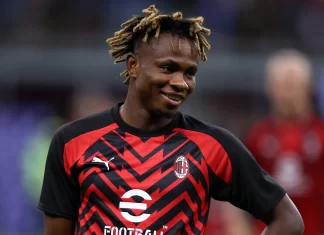Award-winning playwright, theatre director, teacher and poet, Sam Ukala, has been professor of Theatre Arts and Drama since 1995. Presently at the Delta State University (DELSU), his play, Iredi War, got him on the list of the second biggest literary prize in the world, the Nigeria LNG Limited Prize for Literature worth $100,000. In this interview with Assistant Life Editor, TERH AGBEDEH, he talks about his work as well as folkism, a theory he propounded.
You are from Delta State, the Ika community whose folklore you have used in your work. There are those who say that it has been very successful just like what the late Kofi Awoonor did in Ghana. Would you say that is the way to go?
Sam Ukala
There are a few reasons why I think that what we should do as writers is to actually explore our heritage, our artistic patrimony. One reason is because nobody else will explore them for us. A second reason is because our folktales contain the laws that rule us. We didn’t have written constitutions. If somebody said it is bad to steal, it is because it is there entrenched in their verbal art, their folktales and proverbs. And I see that Nigerians are getting more and more bestial, they need to be re-humanised. And I think that the best way to do it is to come from the roots, prick the people’s conscience to enable them realise where they are coming from and that the things they are doing in the cities, they would not dare do them in their villages where there are no written constitutions. Where even if the written constitution were distributed, they would not read it yet they had folklores which sometimes I prefer to call ‘folk-law’.
So, that is one reason I explore that. We need to regenerate our conscience, our traditional values. The second reason is because there has been very serious critical affront on what we have been writing for the literary theatre in Nigeria. Critics have always said that what playwrights were writing were not accessible to the people who were supposed to be their audiences. They read, they will not understand because of complexity in language, obscurity of subject matter and because of foreign methods of presentation. And so, when I am zeroing in on the folk tradition, I am thinking about the kind of expression that we find in folk tradition. Every little child will understand the folktale that is told but that does not mean that language is simplistic, the language is simple but imagistic and every little child will understand how the production, the performance is done. Every little child will understand that the subject has to do with them and so if we write about them in their own language they understand and present what we write in the way that they are used to presenting their stories, then we will increase mass appeal. Everybody would understand what is being done because the essence of writing is to communicate and if you wrote and didn’t communicate, you will alienate your audience and if you did then you have not succeeded as a writer.
So that is why I developed the theory of folkism, which is the tendency to base literary theatre on the history and culture and patrimony of the people. And then to write and produce those plays according to the performance conventions of the folktale which is the most popular narrative tradition in African tradition.
Your plays have travelled the world, but do you think there have been enough productions of your plays in the country or even in the locality whose folklore you have adapted to pass the message across?
The problem that we have in this country is that I might have not even know how many places my plays are being produced because only few people will tell you, ‘oh, we are working on your play, we want to produce your play’. Sometimes I go out as an external examiner only to find that the play they are going to do is my play and they didn’t even warn me. I am an external examiner going to see practical productions and I sit down there and see my play. But if we were abroad, before anyone does your play, they would reach your agent and you have to give permission for the play to be done and a little money is paid to you. But we have not reached that level that is why (Femi) Osofisan said in one interview that the burden we bear is that you write the play and you might be the one to direct it before you can see it because some other people will direct it without getting in touch with you. So that is the problem but I know that a number of universities do my plays almost every year. I know of Abuja, Nsukka, Ilorin, which just finished a production of The Slave Wife about last month. I have taken my plays to UNILAG, UNIBEN, Ekpoma and some other places and often it is when the Society of Nigerian Theatre Artistes is doing its convention and they say ‘bring your play here’ otherwise, who will sponsor the taking round of plays?
The playwright that has done better than all of us in taking round his plays is the late Ola Rotimi and I know he committed so much of his own personal funds in getting that to happen.
You propounded folkism. Do you think other African scholars are doing same in their own communities?
I know that folkism is getting into international discourse gradually. I know that in England for example since the 1990s they have been in touch with that theory because my first article on it was published in Cambridge University. And when I went to England in 1998/99 when I was invited as a writer and a director in residence, we had opportunity to do plays, one of my plays, The Placenta of Death, which toured many places.
Was this at Cambridge University?
No, Manchester. I had to teach the actors and actresses, what to do, how to handle folkism and they really found it unique. Most of the reviews were using the word unique. Also, at that time I did what I call, ‘visual theatre’, which was actually festival drama, in which I got the white girls to don masks, dress like our masquerades and perform along the streets. So, there where there is interest in what is new, it is getting more and more known.
Here in Nigeria Osofisan used it in one of his plays, he used MOA (member of the audience) and if you look at Five Plays in which there is Akpakaland, Osofisan was the one who wrote the introduction and there he talked about the interesting introduction of MOA and he thought that that was what many of them had missed out. So in the next play that he wrote he used it. But I don’t think he has used it again.
The problem that people would face in fully entrenching the folkist tradition is that it requires a research first and foremost. Because if you didn’t research, you would not know what the audience would interject and so you find some people just putting audience interjection as an embellishment. It is not really deeply structured. But in folkism you follow a performance structure that is from the roots, from your folk aesthetics. That is where it comes from. So, before I use any play, and turn any story into a folkist play, I go round audiences where those stories will be performed for me and if I got that same story performed in 10 different towns, I would find interjections from the audience which would be very popular coming from almost every audience. So if I find an interjection which makes 60 percent of the total number of performances that I have found, I pick it out. When I do the play, I put that interjection as the role of the MOA. And I tell you, anywhere the play goes in Africa, the members of the audience would interject, they would give that particular line without knowing that it is in the script.
It sounds like improvisation theatre.
I will come to that. In folkism, the lines are not cast in stone; it is a process. The production is still on because in the traditional aesthetics one folktale will only have one skeletal framework. The words belong to the narrator, who does not memorise anybody’s lines. So, if the same folktale is performed by 20 different persons, you will have different lines, you will have different ways of constructing the lines, you will have different ways of dramatising what is being produced because there is always change. Culture is dynamic and it keeps evolving. When they were talking about tortoise yesterday and tortoise meant an animal that was clever yesterday, today the tortoise will be referring to the fraudster. Because the tortoise of today will come in suit, he will carry a briefcase and drive a good car. The tortoise of yesterday didn’t. So that is it. With folkism, you are always mindful of the audience, that you are using a story that the audience knows.
The MOA part which is crucial in African narrative can only be got right after you have researched the stories you are going to use.













